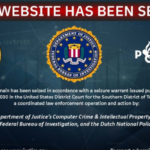The USA Needs an Unbiased Searchable Secure National Website Database.
We in America have found the big media searchable databases do not follow American values. The constant control of what we view, especially in this election, and attempting to force an election outcome to fit their profitability. They do not have America’s best interest at all. That is why the Government needs to build a searchable national database or institute laws against biased searchable databases, that ad-hears to our constitutional standards and void political and profitable bias. It’s time for repeal and replacement. Starting with national control of a secure internet with borders much like each sovereign country has today. Access is controlled by each country. For 28 years America has given away and received nothing in return. America First needs to apply to WWW. Better yet #USAWEB.
In the first article, he says “we have lost our personal data”! YES AND GOOGLE STOLE IT. Made billions on it! Many others did the same!
- We’ve lost control of our personal data
- It’s too easy for misinformation to spread on the web
- Political advertising online needs transparency and understanding

The points found above in Tim’s letter are good point but have no backbone. The web must be secure and controlled by each nation as an asset. No more experiments. We know enough now to build a secure USAWEB. What the rest of the world does to interface with USAWEB can be a function of the State Department and Justice.
America First #USAWEB #USCyber
There are two articles below. One from WEBFOUNDATION.ORG, Sir Tim Berners-Lee and a review article of WWW founder Tim Berners-Lee by Follow USA TODAY’s Jon Swartz @jswartz at SXSW on Twitter.
Three challenges for the web, according to its inventor
Web Foundation · March 12, 2017
Today is the world wide web’s 28th birthday. Here’s a message from our founder and web inventor Sir Tim Berners-Lee on how the web has evolved, and what we must do to ensure it fulfils his vision of an equalising platform that benefits all of humanity.
Today marks 28 years since I submitted my original proposal for the world wide web. I imagined the web as an open platform that would allow everyone, everywhere to share information, access opportunities and collaborate across geographic and cultural boundaries. In many ways, the web has lived up to this vision, though it has been a recurring battle to keep it open. But over the past 12 months, I’ve become increasingly worried about three new trends, which I believe we must tackle in order for the web to fulfill its true potential as a tool which serves all of humanity.
1) We’ve lost control of our personal data
The current business model for many websites offers free content in exchange for personal data. Many of us agree to this – albeit often by accepting long and confusing terms and conditions documents – but fundamentally we do not mind some information being collected in exchange for free services. But, we’re missing a trick. As our data is then held in proprietary silos, out of sight to us, we lose out on the benefits we could realise if we had direct control over this data, and chose when and with whom to share it. What’s more, we often do not have any way of feeding back to companies what data we’d rather not share – especially with third parties – the T&Cs are all or nothing.
This widespread data collection by companies also has other impacts. Through collaboration with – or coercion of – companies, governments are also increasingly watching our every move online, and passing extreme laws that trample on our rights to privacy. In repressive regimes, it’s easy to see the harm that can be caused – bloggers can be arrested or killed, and political opponents can be monitored. But even in countries where we believe governments have citizens’ best interests at heart, watching everyone, all the time is simply going too far. It creates a chilling effect on free speech and stops the web from being used as a space to explore important topics, like sensitive health issues, sexuality or religion.
2) It’s too easy for misinformation to spread on the web
Today, most people find news and information on the web through just a handful of social media sites and search engines. These sites make more money when we click on the links they show us. And, they choose what to show us based on algorithms which learn from our personal data that they are constantly harvesting. The net result is that these sites show us content they think we’ll click on – meaning that misinformation, or ‘fake news’, which is surprising, shocking, or designed to appeal to our biases can spread like wildfire. And through the use of data science and armies of bots, those with bad intentions can game the system to spread misinformation for financial or political gain.
3) Political advertising online needs transparency and understanding
Political advertising online has rapidly become a sophisticated industry. The fact that most people get their information from just a few platforms and the increasing sophistication of algorithms drawing upon rich pools of personal data, means that political campaigns are now building individual adverts targeted directly at users. One source suggests that in the 2016 US election, as many as 50,000 variations of adverts were being served every single day on Facebook, a near-impossible situation to monitor. And there are suggestions that some political adverts – in the US and around the world – are being used in unethical ways – to point voters to fake news sites, for instance, or to keep others away from the polls. Targeted advertising allows a campaign to say completely different, possibly conflicting things to different groups. Is that democratic?
—
These are complex problems, and the solutions will not be simple. But a few broad paths to progress are already clear. We must work together with web companies to strike a balance that puts a fair level of data control back in the hands of people, including the development of new technology like personal “data pods” if needed and exploring alternative revenue models like subscriptions and micropayments. We must fight against government over-reach in surveillance laws, including through the courts if necessary. We must push back against misinformation by encouraging gatekeepers such as Google and Facebook to continue their efforts to combat the problem, while avoiding the creation of any central bodies to decide what is “true” or not. We need more algorithmic transparency to understand how important decisions that affect our lives are being made, and perhaps a set of common principles to be followed. We urgently need to close the “internet blind spot” in the regulation of political campaigning.
Our team at the Web Foundation will be working on many of these issues as part of our new five year strategy – researching the problems in more detail, coming up with proactive policy solutions and bringing together coalitions to drive progress towards a web that gives equal power and opportunity to all. I urge you to support our work however you can – by spreading the word, keeping up pressure on companies and governments or by making a donation. We’ve also compiled a directory of other digital rights organisations around the world for you to explore and consider supporting too.
I may have invented the web, but all of you have helped to create what it is today. All the blogs, posts, tweets, photos, videos, applications, web pages and more represent the contributions of millions of you around the world building our online community. All kinds of people have helped, from politicians fighting to keep the web open, standards organisations like W3C enhancing the power, accessibility and security of the technology, and people who have protested in the streets. In the past year, we have seen Nigerians stand up to a social media bill that would have hampered free expression online, popular outcry and protests at regional internet shutdowns in Cameroon and great public support for net neutrality in both India and the European Union.
It has taken all of us to build the web we have, and now it is up to all of us to build the web we want – for everyone. If you would like to be more involved, then do join our mailing list, do contribute to us, do join or donate to any of the organisations which are working on these issues around the world.
Sir Tim Berners-Lee
The Web Foundation is at the forefront of the fight to advance and protect the web for everyone. We believe doing so is essential to reverse growing inequality and empower citizens. You can follow our work by signing up to our newsletter, and find a local digital rights organisation to support here on this list. Additions to the list are welcome and may be sent to contact@webfoundation.org
Article of WWW founder Tim Berners-Lee by Follow USA TODAY’s Jon Swartz @jswartz at SXSW on Twitter.
I partially agree with the review. He is assuming his experiment with WWW can still be controlled by elements outside national laws. I think this is very naïve, especially after all this time. Without each nation controlling its assets based on each nation’s laws, we will always have bad elements controlling the internet. The internet we have today is highway robbery for many people in the world and beyond government control. Fact that no government or limited government control exists, we are wide open for use for greed, hacking, and all sorts of criminal activity. To me, I see very little good for the USA, and great for the world player who has stolen much of America’s intellectual property and wealth.
It’s time to start again from the ground up with a secure web for the USA. USA WEB, not WWW.
Tim Berners-Lee, who invented the World Wide Web, now wants to save it. It’s beyond saving. I say Repeal and Replace here in America. Tim Berners-Lee should find a solution for Brits.
The computer scientist who wrote the blueprint for what would become the World Wide Web 28 years ago today is alarmed at what has happened to it in the past year.
“Over the past 12 months, I’ve become increasingly worried about three new trends, which I believe we must tackle in order for the web to fulfill its true potential as a tool which serves all of humanity,” he said in a statement issued from London. He cited compromised personal data; fake news that he says has “spread like wildfire”; and the lack of regulation in political advertising, which he says threatens democracy.
“Even in countries where we believe governments have citizens’ best interests at heart, watching everyone, all the time is simply going too far,” he said, in an allusion to WikiLeaks’ disclosure of what documents claim is a vast CIA surveillance operation. “It creates a chilling effect on free speech and stops the web from being used as a space to explore important topics, like sensitive health issues, sexuality or religion.”
Berners-Lee, 61, who was knighted, founded Web Foundation in 2009 to improve the web as part of a five-year plan.
When Berners-Lee submitted his original proposal for the Web, he imagined it as an open platform that would allow everyone, everywhere to share information, access opportunities and collaborate across geographic and cultural boundaries.
What an arrogant idea. How many people will be taken before this is nationally regulated?
But his faith, and those of privacy advocates and cybersecurity experts, has been badly shaken by a series of high-profile hacks and the dissemination of fake news through the use of data science and armies of bots.
Front and center: The WikiLeaks bombshell. The treasure trove of more than 8,000 pages reads like a John Le Carre spy novel overrun with Edward Snowden-like protagonists. The CIA, with sophisticated hacking tools, has been angling to turn popular consumer devices such as iPhones, before Samsung TVs and Android smartphones into surveillance devices, the documents indicate.
Imagine that Big Brother scenario extended to the millions of smart devices such as digital thermostats and fire alarms feeding the Internet of Things ecosystem, and you have a problem that could eviscerate the privacy of billions of people, say security experts.
Monique Morrow is correct about the assault because of the basic failure of “open to all”! The rest of the info below once again uses so-called www tools to manage legitimacy with no bases in law.
Berners-Lee is just the latest high-profile technologist to share concerns over what former Cisco Systems executive Monique Morrow calls a fundamental assault on privacy and cybersecurity, with critical infrastructure — banking systems, the grid — hanging in the balance. “How do we use technology responsibly?” she asked at an SXSW talk in Austin Saturday.
More from SXSW
The scourge of fake news, a topic of several panels here, has prompted plenty of tech types to brainstorm solutions. One idea is to apply a simple rating system to stories based on their news value and accuracy, says Amar Lalvani, CEO of hotel chain Standard International. “We could apply the same model to stories as we do to travel sites,” he said here Sunday.
The proliferation of cyberweapons poses a significantly greater threat — especially smartphones in the hands of unwitting consumers, and eavesdropping TVs in their living rooms — because they spread at a faster rate than physical weapons, says Phil Reitinger, CEO of the Global Cyber Alliance and a former director of the National Cybersecurity Center.
“It’s already happening,” says Sean Smith, a professor of computer science at Dartmouth College and author of The Internet of Risky Things. He says many of the same security vulnerabilities exploited in phones, TVs, and computers outlined by WikiLeaks apply to IoT devices.
“If the CIA is working on breaking into phones like other hackers, you can bet it’s working on other devices, just like hackers,” Smith says, pointing to malware that was wormed its way into some medical devices at major healthcare providers across the globe. The security breach put tens of thousands of patient records at risk, says TrapX Security.
The same flaws can apply to cars, as proved by a Wired report on how hackers remotely hijacked a Jeep Cherokee’s digital system over the Internet and disabled its brakes at low speeds in 2015, Smith says.
“What WikiLeaks said is Shakespearean when you think about it: It’s much ado about nothing,” says Vince Steckler, CEO of computer security firm Avast Software, “What was revealed has been an open secret for years in the security community. If anything, (the disclosure) informs the general public how exposed infrastructure really is. And that might be a good thing.”





Leave a Reply